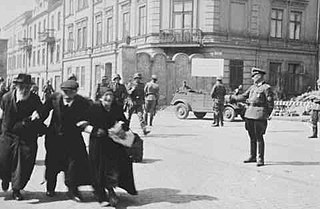Aktion Krakau
| Aktion Krakau | |
|---|---|

Kraków Ghetto. German checkpoint during the anti-Jewish Operation Aktion Krakau in 1942
|
|
| Also known as | German: Einsatz Krakau |
| Location | Occupied Kraków |
| Date | June 1942 - March 1943 |
| Incident type | Mass deportations to extermination camps |
| Perpetrators | Amon Göth, Julian Scherner, Odilo Globocnik and others |
| Participants |
|
| Organizations | Waffen-SS, Schutzstaffel, Orpo Battalions, Sicherheitsdienst |
| Camp |
Bełżec Auschwitz II Kraków-Płaszów |
| Ghetto | Kraków Ghetto including other Jewish ghettos in German-occupied Poland |
| Victims | Over 11,000 |
| Memorials | Ghetto site and deportation point |
| Notes | The most lethal phase of the Holocaust. |
Operation Reinhard in Kraków, often referred to by its original codename in German as Aktion Krakau, was a major 1942 German Nazi operation against the Jews of Kraków, Poland. It was headed by SS and Police Leader Julian Scherner from Waffen-SS. The roundup was part of the countrywide Aktion Reinhard (Operation Reinhard), the mass murder of Polish Jews in the so-called General Government under the command of SS und Polizeiführer Odilo Globocnik.
Beginning in 1941, all Jewish inhabitants of Kraków were ordered to relocate into the newly established Ghetto Krakau situated in the Podgórze district, away from the predominantly Jewish district of Kazimierz. A German Labour Office (Arbeitsamt) was set up for those employed outside the Ghetto. At the beginning of 1942, the entire Jewish population of Greater Kraków (including 29 surrounding villages) was forced to move into the same Ghetto with each person granted 4 cubic meters (140 cu ft) of space. On 1 June 1942 the ghetto was surrounded by German police and SS. To conceal the purpose of the "Aktion" and calm the Jewish population, the SD and SiPo officers – among them SS-Obersturmbannführer Willi Haase, SS-Obersturmführer Becher, and SS-Hauptscharführer Heinrich – told the Jews of a "resettlement" programme. Jews who worked in German factories were permitted to remain, while the first transport of 7,000 Jews were assembled on Zgody Square and escorted to the railway station in Prokocim. On 5 June 1942 additional 4,000 Jews were deported to Bełżec extermination camp in a similar way.
...
Wikipedia
